THE FAIREST FORCE
5. CONTRACTS
*****
All nursing staff employed to work in hospitals under War Office control as a temporary measure during wartime were required to sign a contract. When working overseas, even as civilians, they could be subject to the same type of military discipline dispensed to serving officers and men and had to adhere to strict regulations relating to every aspect of their work and off-duty time. Many different forms of agreement were used over the course of the war to suit the various types of staff and the changing situation. Members of the permanent arm of QAIMNS served under different regulations and following an initial set period of three years’ service their agreements could be terminated by one month’s notice on either side.[56] Although there is discussion in the war diary where the Matron-in-Chief suggests that members of the permanent service were not allowed to resign in wartime other than in unavoidable circumstances it is unclear how this rule arose. When new regulations for the service were issued in 1916, any mention one month’s notice being required had been omitted. In the event, the only cases of QAIMNS nurses terminating their agreements during the war appear to be on marriage, on health grounds, or in the few cases of death in service.
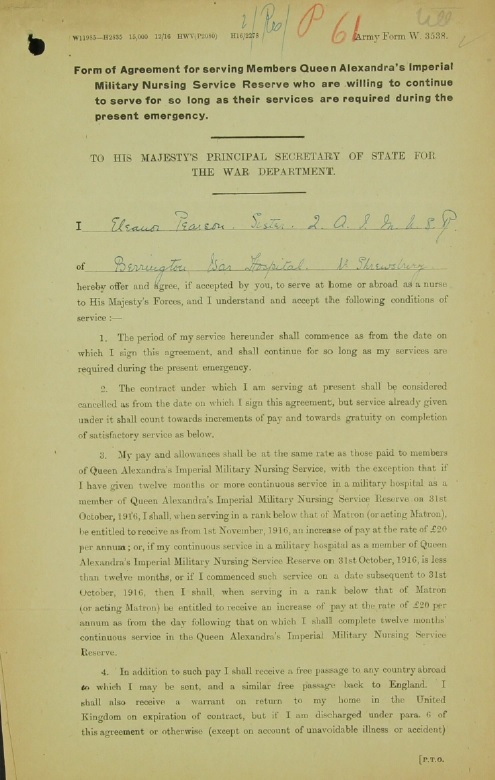
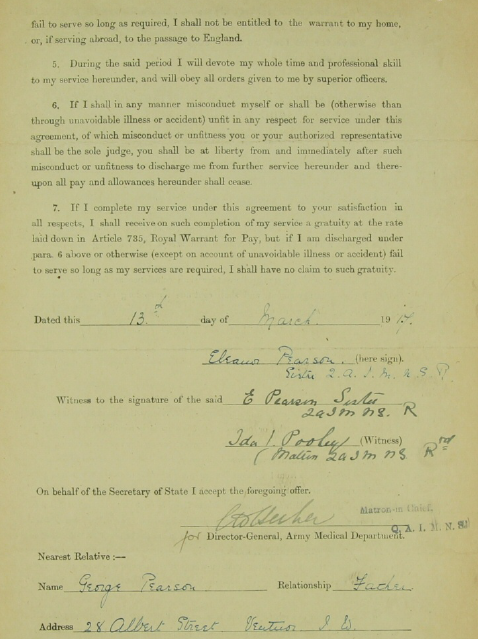
QAIMNS Reserve Contract Army Form W.3538 for Eleanor Pearson [The National Archives WO399/6562]
The basic contract for trained nurses of all services was for one year which could be extended for a further similar period if required. When it became clear that the war was likely to be a long one, there was a need to provide a more permanent force of experienced staff without the worry that they would be tempted to seek alternative employment at the end of each year. While the yearly contract remained, a new type was introduced which offered trained nurses an extra £20 a year in return for their commitment to serve ‘so long as my services are required during the present emergency.’ This contract was carefully worded and while committing the nurse to an unknown period of work it gave her no protection if the need for her services suddenly came to an end.
After the Armistice many women discovered that their employment could be terminated with as little as forty-eight hours’ notice.[57] By early 1918 the need for trained nurses was critical; the pot was not bottomless – it took three years to train a nurse and so many had already been absorbed by the war that it was vital to encourage everyone to stay as long as possible. Consequently, six-month contracts were offered to women who were seeking a change or hesitating over committing themselves for a further year with the military nursing services. For untrained nursing staff i.e. members of Voluntary Aid Detachments (VADs) six-month contracts were usual, perhaps more for the benefit of the authorities than the nurse, and allowing them to more easily rid themselves of any unsuitable women. In similar fashion to the trained nurse they could also agree to serve until their services were no longer required, but instead of receiving an extra £20 each year they became entitled to annual increments of £2.10s. which over the course of the war could raise their basic yearly pay from £20 to £30.[58]
A selection of contracts can be found in service records, all with subtle differences in wording:
Army Form W.3536: Agreement for Candidates for Q.A.I.M.N.S. Reserve who are willing to serve for a period not exceeding 12 months.
A.F. W.3537: Agreement for Candidates for Q.A.I.M.N.S. Reserve who are willing to serve so long as required during the present emergency.
A.F. W.3538: Agreement for serving members of Q.A.I.M.N.S. Reserve who are willing to continue to serve so long as required during the present emergency.
A.F. W.3539: Agreement for V.A.D. Members and other candidates for employment on nursing duties in military hospitals who are willing to serve for a period of six months.
A.F. W.3540: Agreement for V.A.D. members and other candidates for employment on nursing duties in military hospitals who are willing to serve so long as required during the present emergency.
A.F. W.3541: Renewal of contract for V.A.D. members and others employed on nursing duties in military hospitals who agree to serve for a further six months.
A.F. W.3542: Renewal of contract of V.A.D. members and others employed on nursing duties in military hospitals who agree to serve so long as required during the present emergency.
A.F. W.3548: Agreement for members of T.F.N.S. who are willing to serve abroad if required during the present emergency. [59]
A.F. W.3660: Agreement for Assistant Nurses in Military Hospitals.
It will be noticed that contracts for members of the Territorial Force Nursing Service only refer to agreeing to overseas service and offer no choice as to whether that was to be for one year, or ‘for the duration’. This was because most members of the service were bound by a single form of contract which stipulated:
The period of my service hereunder shall commence as from the date on which I sign this agreement and shall continue for so long as my services are required during the present emergency
It sometimes seems that many women didn’t appreciate at the time of first signing just how binding their contract would be. If they later applied to resign, they were reminded that there was no option for resignation by members of the TFNS during wartime except for the most worthy of reasons, e.g. ill-health, marriage, or other insurmountable problems. Contracts both ‘for the duration’ and for one year can be found within some TFNS service files, sometimes both types having been signed by the same member at different times, but the overall impression from contemporary records is that the former usually applied. While there was no simple way in which a nurse could be prevented from breaking her contract, giving notice and leaving, not only would it be impossible for her to get home from abroad without permission but it would also prove difficult for her to find suitable alternative employment in the future without a reference.
Women became adept and inventive in producing reasons for resignation which they hoped would be found acceptable. If they cited marriage, care needed to be taken as a subsequent request for a reference would find them out if the event never materialised. Specifying an urgent need to care for sick parents or family members was popular and even if untrue was hard to disprove. During the final year of the war this reason was being offered so frequently that nurses were often asked to provide a private medical certificate or letter to support their relative’s illness. If a nurse did leave mid-contract for what were considered to be ‘personal reasons,’ and her contract was ‘for the duration’ she was required to pay back the extra portion of her salary that had already been advanced in return for her commitment to work until her services were no longer required.
During the second half of the War there was increasing publicity and unrest concerning one clause in contracts which came to be known as the ‘Serf Clause.’ The offending section, which was present in every type of contract, included the lines:
If I shall in any manner misconduct myself, or shall be (otherwise than through unavoidable illness or accident) unfit in any respect for service under this agreement, of which misconduct or unfitness you or your authorized representative shall be the sole judge, you shall be at liberty from and immediately after such misconduct or unfitness to discharge me from further service hereunder, and thereupon all pay and allowances hereunder shall cease.
From mid-1917 the perceived unfairness of the wording was taken up both in the national press and in nursing journals. The British Journal of Nursing led the way, campaigning vigorously for changes to be made and declaring the clause ‘demoralizing’. In an article titled ‘The Serf Clause Must Go,’ they wrote:
Many well-educated trained nurses are compelled to deny themselves the privilege of nursing our sick and wounded in the Imperial Army Nursing Services, because they decline to submit to such an unjust and dangerous contract … One fine day this Clause was enforced against one of the best and most devoted Sisters, whose work we have known intimately for twenty years. At a moment’s notice, without explanation or power of appeal, this Sister was turned out of the Service; and had she not been known to us, might, after seven years’ active service for the sick and wounded in South Africa, and during this war, have been professionally ruined.[60]
After many letters and much lobbying the clause was eventually amended in March 1918[60A], the offending paragraph removed and replaced by the wording:
Provided that in the event of my services being terminated for misconduct, I shall have the right to appeal through the ordinary official channels to the Secretary of State.
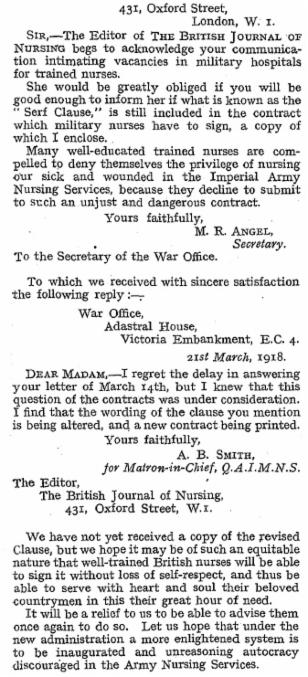
Letters to the British Journal of Nursing, 30th March, 1918
Out of the many thousands of nurses who served with the military nursing services in wartime this clause must have touched only a small minority but it supplied interest and copy for the press for many months.
After the Armistice, as the long run-down of hospitals and staff began, it seemed at first that nurses could not be demobilised quickly enough. However, by the end of 1919 the situation was less clear. Many thousands of men and women were still serving in France and Germany and there was an ongoing demand for hospitals and staff in other overseas stations such as India and Malta. This resulted in a continuing need for long-term reservists within the British military nursing services and in April 1920, with numbers at their lowest for six years, a new contract was introduced for members of QAIMNS Reserve and the TFNS who were willing to engage for a further period of one or two years’ service with improved scales of pay and allowances.
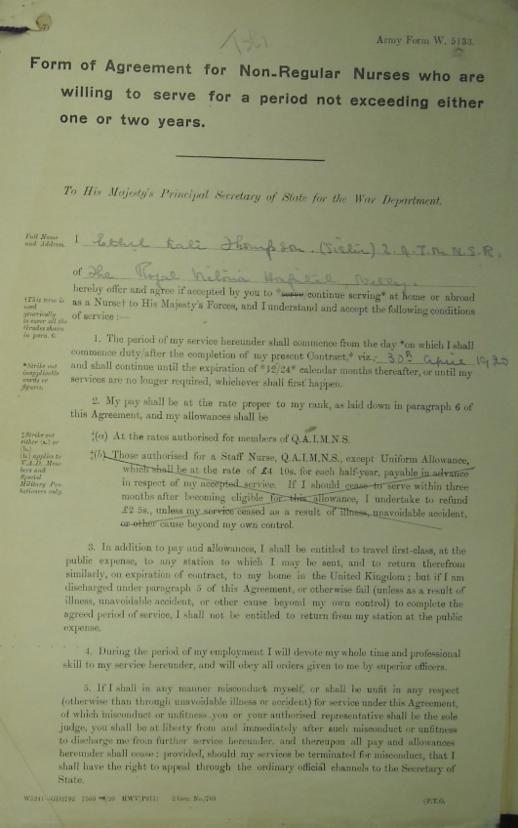
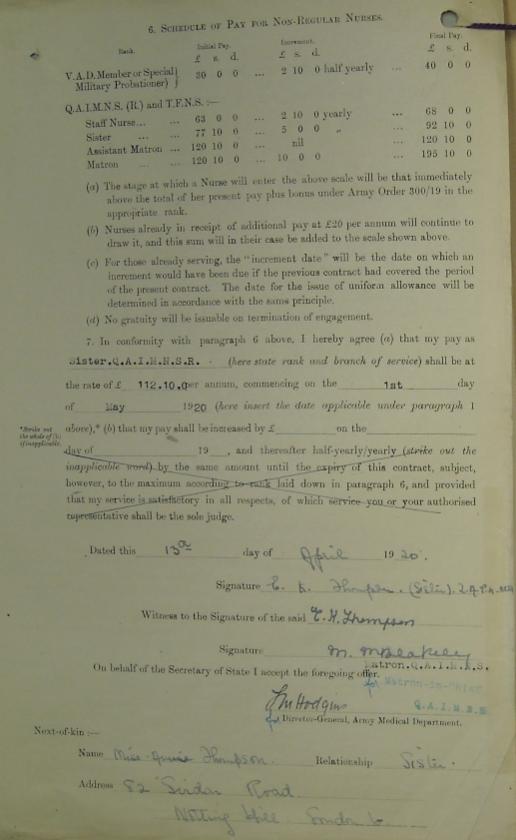
For women who had become accustomed to Army life it meant a further period of relative security and the chance for more travel without the need for long-term commitment, and many relished the opportunity and signed willingly.
*****
[56] Regulations for Admission to Queen Alexandra’s Imperial Military Nursing Service in The National Archive, WO32/6404
[57] Discussion of this can be found in the later section on ‘Demobilisation.’
[58] Army Council Instruction 2306 of 1916 includes details of increases for all grades
[59] Army Council Instruction 286 of 1917: this list is not exhaustive and many other forms of contract can be found, all with very similar conditions and wording
[60] British Journal of Nursing, March 30, 1918, pages 222-223
[60A] Army Council Instruction 676 of March 1918.